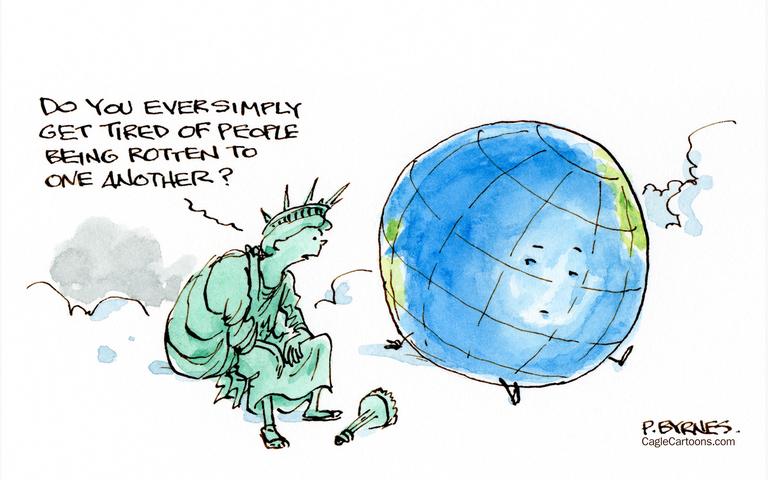|
Local View: The US a model for the world — of intolerance |
 |

By John Freivalds
Published 12/14/21
Duluth News Tribune
We like to regard our country as a shining, welcoming light on the hill, beaming out “love between our brothers and our sisters,” as Peter, Paul and Mary sang in “If I Had a Hammer.” We like to point to the positive politicians we have had: Martin Sabo, Hubert Humphrey, Walter Mondale, and, yes, Arne Carlson and Bob Dole.
But the truth is that the USA, if not Minnesota, always has had a dark underside — from its very beginning. And every so often that dark underside appears, dredged up by the recurring demagogue of the times, and overwhelms our better angels.
The issue of slavery is raised today in teaching, but few know that U.S. segregation policies served as a model for the Nazis in Germany. Yep, it is true. We educated the Nazis; it’s not that they infected us. So, the parades and violence of the Charlottesville riots and storming the U.S. Capitol by the Proud Boys and others are repeats of what the Nazis did in Germany.
Today’s neo-Nazis are not an aberration. They have always been there, smoldering, some finding their way into former President Donald Trump’s base, sometimes described by media pundits as “less-educated white males.“ Trump’s rhetoric and misinformation served as an awakening until the base sometimes felt disenfranchised from mainstream America, with the fear that dark-skinned people were a majority and would take away guns. At last count, Americans had nearly 400 million guns!
I recommend James Q. Whitman’s well-researched 2017 book, “Hitler’s American Model,” which examines how Hitler’s Third Reich found sustenance for its race-based initiatives in American law. In fact, Nazi Germany sent 45 lawyers to the U.S. in 1935 to study American segregation laws. They were amazed at U.S. legislation. Whitman notes:” This went beyond segregation governing America Indians, citizenship criteria for Filipinos and Puerto Ricans as well as African Americans, immigration regulations and prohibitions against miscegenation and some 30 states. No other country, not even South Africa, possesses a comparably developed set of relevant laws.”
Pretty much only the Jewish population in this country was alarmed at first by the Nazis. That’s because, at the time, many in the U.S. were anti-Semitic. Many called President Delano Roosevelt’s “New Deal” economic programs the “Jew Deal.” This was before World War II and the Holocaust. Since we eventually went to war against the Nazis, this past relationship is forgotten.
In 1935, the Nazis passed their infamous two laws, the Reich Citizenship Law and the Law for the Protection of German Blood and Honor, collectively known as the Nuremberg Laws. They defined a person’s place in the Nazi racial superstructure. But the Nazis had a tough time figuring out who was what. Whitman writes: “The Nazis looked to America and how American jurisprudence classified race. Controversial rule stipulated that anyone with any Black ancestry was legally Black and could not marry a white person. Laws also defined what made a person Asian or Native American. … Virginia even had a Pocahontas exemption for prominent white families who claimed to be descended from Pocahontas.”
This story does not end with the Nazis, as, it seems, Trump is taking America’s intolerant background overseas with his praise for dictators in Hungary, the Philippines, and Turkey. He really seems to be behind President Jair Bolsonaro of Brazil. The New Republic notes: “Bolsonaro is now attempting to link events in Brazil to the broader network of fantastical delusions, resentments, and outrages that fuel the Trump base and, by extension, much of the Republican Party. Bolsonaro … wants to make Brazil the next MAGA battleground.”
The only good news in all this is that the U.S. and the world eventually right themselves and, for at least two generations, we will have peace. But we, of course, won’t be around to taste all of it.
John Freivalds of Wayzata, Minnesota, is the author of six books and is the honorary consul of Latvia in Minnesota. His website is jfapress.com. He wrote this for the News Tribune.
